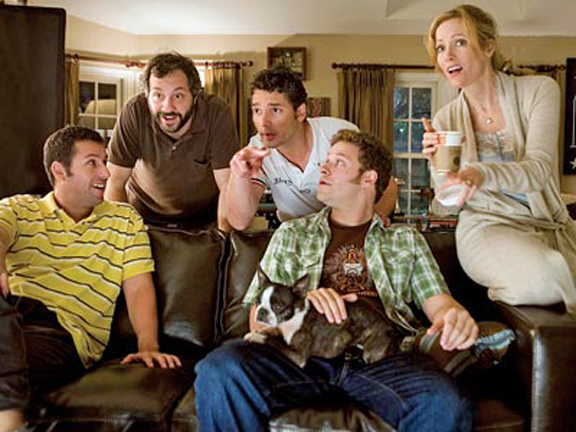If there is a King of Comedy right now in Hollywood, that would be Judd Apatow. I have a list here of a dozen comedies he has produced and/or directed just in the last five years, and I left out the titles I didn’t like. He has been writing since he was a kid, producing since he was 23, and then he directed “The 40-Year-Old Virgin” (2005) and “Knocked Up” (2007) himself. He is only 41. I think he’s hitting his stride.
Now he has directed Adam Sandler, arguably the top comic star in town, in a film about a stand-up comic who gets a death sentence from his doctors. And no, “Funny People” (opening July 31) isn’t about how this is a wake-up call for the comic, making him into a better human being.
“I thought an interesting story would be about someone who goes the other way and learns almost nothing from their near-death experience,” Apatow informed me.
It’s that kind of inversion of stereotypes that he did so well in his first two directorial credits. A 40-year-old man isn’t expected to be a virgin. A woman with a big TV job shouldn’t become pregnant with some basically nice guy she meets in a club. She shouldn’t be basically nice, either.
Apatow has written hundreds of thousands of words for some of the best comedians in America, including Roseanne Barr, Garry Shandling and Jim Carrey. Most producers don’t write much of anything and some even pay people to read for them. He worked outside the formulas in producing 65 episodes of the “Larry Sanders Show,” on which timing and nuance were everything. You have the feeling “Funny People” grows directly out of his experiences and observations.
“Because I was a comedy fan first and foremost,” he said in an e-mail interview, “I had a good ear for writing in the voice of the comics I was writing jokes for, but it took me decades to believe my own point of view would be interesting to people. I could never believe that comics would allow me into their world. The hard part about writing this movie was the fact that the comedians I wrote for were very nice to me. Nothing dramatic every happened.”
George Simmons, the Sandler character, is not a very nice man. He’s not an evil creep or a drugged zombie or anything like that, but he’s closed-off, cool to people, very rich successful, with a series of hit movies, imperious, with no friends. Think Jerry Seinfeld if all of those things were true of him, which they certainly are not. Then show your hero hearing his doctor informing him he has a limited time remaining on earth.
“Sadly,” Apatow said, “I have known quite a few people who have been seriously ill in the last few years. I’ve watched them struggle with the ups and down of their situations. There are many important lessons that people learn when they are fighting an illness. Aspects of it can be very positive, and their connections with their friends and family often become much closer and richer.
“George Simmons’ ego is so out of control that he interprets all the wrong lessons from his situation, and that’s where the comedy comes from. In movies on this subject the lead character usually changes dramatically and becomes a perfect person. I thought it would be more fun and more truthful to show someone resist the change.”
There are a lot of laughs in “Funny People,” even though much of it is about funny people when they are not being funny. Stand-ups frequently make a living being funny about their miseries, and the habit is not easily broken. Remember Richard Pryor being hilarious about his conversations with cocaine.
“My goal was to make a film that was just as funny as my other two films, but which also dug a lot deeper and was not afraid to be more emotional,” Apatow said. “We didn’t put anything in the film just to be funny–it also had to get at the truth of this type of situation. It was very scary because I am so used to letting the laugh count guide me as to whether or not the movie is working well. Sometimes this movie is working really well when there are no laughs. That’s new for me. I prefer to hear noises from the crowd wall-to-wall to make me sleep better at night.”
I have not been the biggest fan of Adam Sandler‘s films. Yet he has surprised me whenever he moves outside his basic childish persona and works for a director with other ideas. He is a good actor and he can go there. Consider Paul Thomas Anderson‘s “Punch-Drunk Love” (2002). Or his work in Mike Binder‘s “Reign Over Me” (2007). Or Peter Segal‘s “50 First Dates” (2004). Now consider “Funny People,” and his performance built from nuance, timing, and a lot of insight into a famous comic who is a lot more than famous or comic.
Apatow and Sandler have long known each other, although amazingly they’ve never worked together. Apatow’s wife, the actress Leslie Mann, co-starred with him in “Big Daddy” ten years ago, became a close friend, and in “Funny People” she plays a person he can trust.
“I think Adam hesitates to take on more serious work because he looks for directors he trusts. We’ve known each other for twenty years so he was willing to completely put himself in my hands. There was never a moment when he said ‘I don’t want to do this because it might make me look bad,’ or because ‘it cuts too close to the bone.’ He was very brave. And I must say, it was very painful to watch him perform the more intense scenes when his character was sick because I knew that he had experiences moments like that with his family in real life, as had I.”
Apatow as a teenager hung out in comedy clubs on Long Island, “used to highlight the TV Guide so I would know who was going to be on which show that week,” got a job a comedy club dishwasher, idolized the stand-up guys. It’s not hard to figure who the autobiographical character is in “Funny People.” That would be the newly thin Seth Rogen, as a rookie comic who becomes George Simmons’ assistant, flunky, and even opening act.
His admirable weight loss makes Rogen look younger, which suits the role, and also provides dialogue. “I always try to acknowledge what the audience might be thinking, Apatow said. “I knew people would notice Seth’s new skinny physique and it made sense that his friend in the movie, played by Jonah Hill, would mock him for it. He tells him that nobody wants to laugh at a physically fit man. I must say there’s an argument that that’s true. My friend Kevin Rooney used to say, ‘If you have time to work out you don’t have time to work on your act’.”
Funny. I was thinking that the same is true about film criticism. But I’ll keep that to myself. Rim shot. Thank you very much. You’ve been a great audience.












